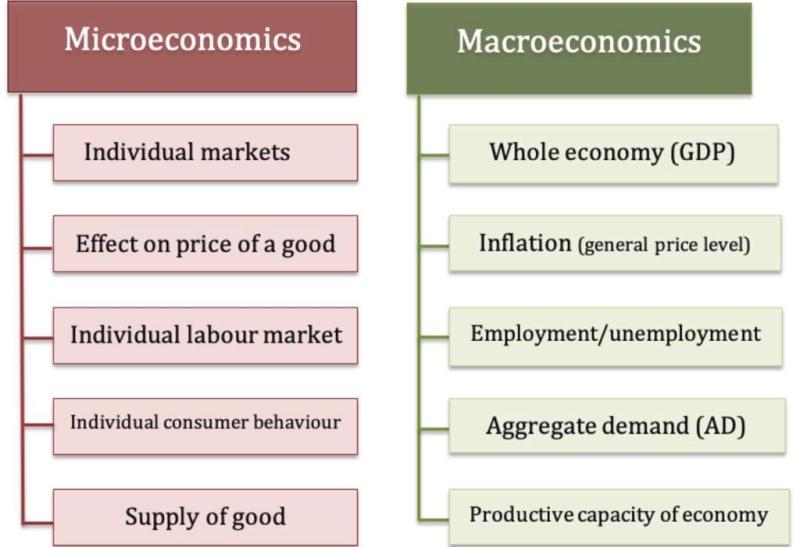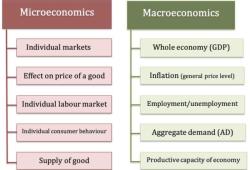What is intermediate macroeconomics?
Intermediate macroeconomics is a level of study in the field of economics that delves deeper into the analysis of aggregate economic phenomena at a more advanced and nuanced level than introductory courses. It typically follows introductory or principles of macroeconomics courses and precedes more advanced or specialized studies in macroeconomics. This level of coursework is often found in undergraduate or early graduate-level economics programs.
Here's an overview of what intermediate macroeconomics entails:
Focus on Aggregate Economy:
- Intermediate macroeconomics focuses on the economy as a whole, examining aggregate measures such as gross domestic product (GDP), unemployment rates, inflation rates, and overall economic growth.
Macroeconomic Models:
- Students in intermediate macroeconomics often encounter more sophisticated macroeconomic models that build on the basic models introduced in introductory courses. These models help explain the relationships among key macroeconomic variables.
Government Policy Analysis:
- The course may cover the role of government in influencing the economy through fiscal policy (government spending and taxation) and monetary policy (control of the money supply and interest rates).
International Economics:
- Intermediate macroeconomics often includes an examination of international aspects of the economy, such as exchange rates, trade balances, and the impact of globalization on national economies.
Economic Growth:
- Study of the determinants of long-term economic growth is a common component. This involves analyzing factors that contribute to an increase in a country's standard of living over time.
Unemployment and Inflation:
- In-depth analysis of issues related to unemployment and inflation, including theories explaining their causes and potential policy responses.
Business Cycles:
- Exploration of economic fluctuations and business cycles, investigating why economies experience periods of expansion and contraction.
Data Analysis:
- Intermediate macroeconomics often includes more advanced techniques for analyzing economic data, including statistical methods and empirical research.
Policy Implications:
- Students learn to evaluate and critique macroeconomic policies, understanding how different policy choices can impact economic outcomes.
Intermediate macroeconomics provides students with a more sophisticated understanding of the forces shaping national economies. It serves as a foundation for more advanced studies in macroeconomics or related fields and is crucial for individuals pursuing careers in economic research, policy analysis, or other areas where a deep understanding of macroeconomic principles is essential.
Intermediate Macroeconomics: Diving Deeper
Intermediate macroeconomics builds upon a foundation of basic economic principles to delve into the complexities of national economies. Here's a breakdown of its key aspects:
1. Covered Topics:
- Aggregate Economic Models: Understanding how factors like consumption, investment, and government spending interact to determine national output, employment, and inflation.
- Business Cycles: Analyzing the fluctuations in economic activity, exploring theories and policy responses.
- Monetary Policy: Examining how central banks use tools like interest rates and quantitative easing to influence economic conditions.
- Fiscal Policy: Evaluating the impact of government spending and taxation on aggregate demand and economic growth.
- Open Economy Macroeconomics: Analyzing the implications of international trade and finance on national economies.
- Labor Markets: Investigating determinants of wages, unemployment, and labor market policies.
- Economic Growth: Exploring factors influencing long-term economic expansion and development strategies.
2. Building on Basic Principles:
Intermediate macroeconomics goes beyond introductory concepts like supply and demand by:
- Formalizing models: Utilizing mathematical and graphical models to analyze economic relationships more rigorously.
- Introducing dynamic analysis: Examining how decisions and policies impact the economy not just in the short run, but also over time.
- Exploring theoretical debates: Critically evaluating different schools of thought and their policy implications.
- Emphasizing empirical evidence: Analyzing real-world data to test theoretical predictions and inform policy decisions.
3. Complexities Addressed:
Intermediate macroeconomics tackles real-world complexities like:
- Uncertainty and expectations: How do expectations about future economic conditions influence current decisions?
- Distributional issues: How do policies and economic trends affect different income groups and individuals?
- Inefficiencies and frictions: How do factors like market imperfections and information asymmetries impact economic outcomes?
- Government failures: Can government interventions create unintended consequences or distort market mechanisms?
4. Contribution to Advanced Analysis:
Intermediate macroeconomics lays the foundation for advanced economic analysis in several ways:
- Equips students with analytical tools: Macroeconomic models, statistical techniques, and critical thinking skills.
- Provides deeper understanding of policy implications: Analyzes the effectiveness and limitations of various policy options.
- Stimulates further research: Raises questions and generates curiosity for further exploration in specialized fields.
5. Prerequisites:
Typically, successful completion of introductory economics courses covering microeconomics and macroeconomics at the undergraduate level is required. These courses provide essential knowledge of basic economic concepts, supply and demand analysis, and market mechanisms. Additional prerequisites may vary depending on the specific institution and program.
In essence, intermediate macroeconomics is a challenging and rewarding pursuit that unlocks a deeper understanding of how economies function and the complexities they face. If you're interested in exploring the intricate world of national economies, this level of study can provide valuable tools and insights for further exploration and potential career paths in economics, finance, or policy analysis.



